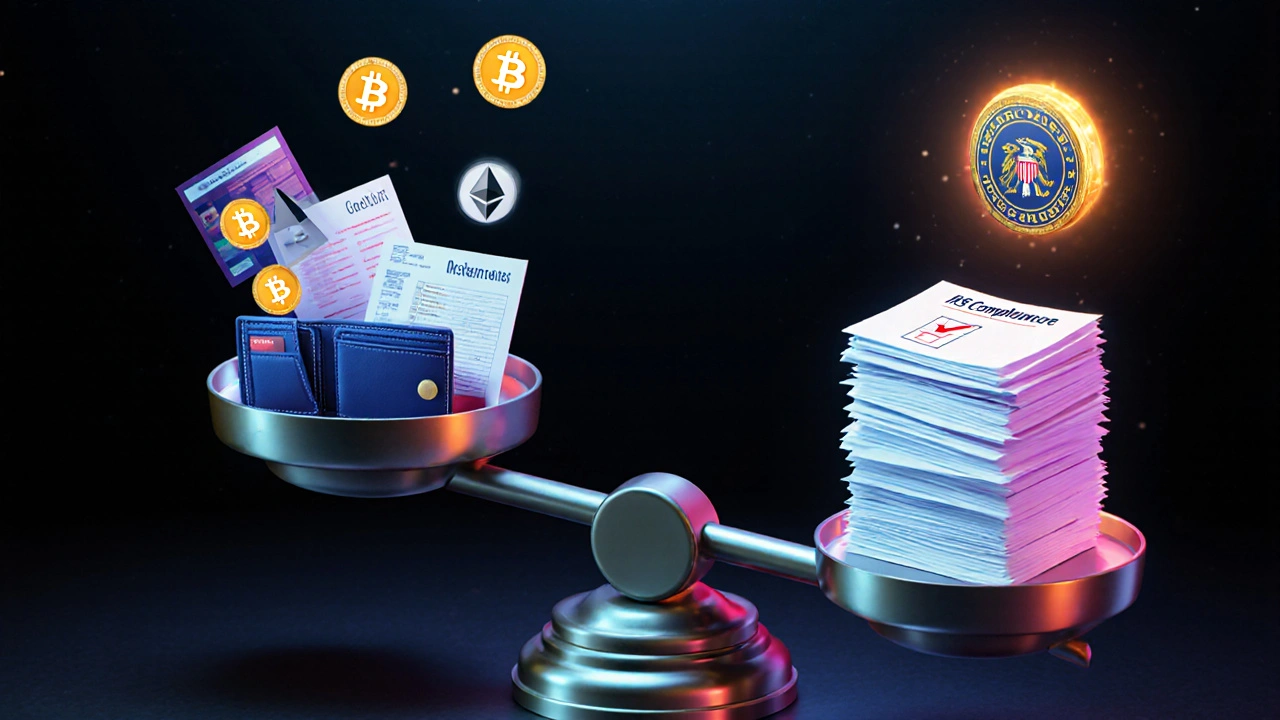When you trade, stake, or mine cryptocurrency, the IRS treats it like property - not cash. That means every swap, every airdrop, every DeFi reward creates a taxable event. But most CPAs still use spreadsheets built for stocks and bonds. If your CPA doesn’t have a crypto tax checklist, you’re risking an audit, penalties, or worse - paying thousands more than you owe.
Why Crypto Needs a Special Checklist
Traditional tax forms don’t work for crypto. You can’t just report a capital gain from selling Bitcoin like you would from selling Apple stock. Crypto moves across wallets, exchanges, and decentralized protocols. A single year might include 500+ transactions: swapping ETH for UNI on Uniswap, earning staking rewards from Lido, paying gas fees in ETH, and receiving an NFT airdrop. Each one has different tax rules. The IRS reported over 12,400 crypto-related enforcement actions in 2022 - up 166% from the year before. And they’re not bluffing. In 2024, the IRS began data-sharing agreements with 46 major exchanges. That means if you didn’t report your Coinbase trades, they already know. Your CPA’s job isn’t just to file your return - it’s to prove you did it right.7 Must-Have Documentation Categories
A solid crypto CPA checklist isn’t a suggestion. It’s a survival tool. Here’s what your records must include:- Asset Verification: You must prove you owned the crypto at year-end. That means wallet addresses, blockchain explorer screenshots showing balances, and proof you control the private keys. No screenshots of exchange balances alone - those don’t count. 92% of audit failures happen because clients couldn’t prove ownership.
- Transaction History: Every single transaction - buys, sells, swaps, transfers - needs a timestamp, amount, counterparty address, and USD value at the time. Export CSVs from Coinbase, Kraken, Binance. Connect your MetaMask or Ledger via API. Don’t rely on exchange summaries. Missing one swap could mean misclassifying a $15,000 gain as a $0 gift.
- Income Documentation: Staking rewards? Taxable as ordinary income. Airdrops? Also ordinary income. Mining? Income minus electricity and hardware costs. Hard forks? Taxable when you control the new coin. Camuso CPA found 43% of underreported income comes from clients not tracking these. Keep validator names, dates, and amounts.
- Cost Basis Tracking: You need to know what you paid for each coin. FIFO (first in, first out) is the default, but you can use LIFO, HIFO, or specific identification - if you document it. Onchain Accounting found 78% of errors in high-volume traders come from mixing methods or not reconciling with exchange records. Use software. Don’t guess.
- Expense Separation: Can you deduct mining electricity? Yes - 100%. What about meals at a crypto conference? Only 50%. Personal gas fees? No. Your CPA needs to separate business from personal. Keep receipts. Log mileage if you drove to a mining farm.
- Compliance Screening: If you sent crypto to a wallet tied to a sanctioned entity (like a Russian or Iranian address), you could be violating OFAC rules. For transactions over $10,000, automated screening tools like Chainalysis are no longer optional. Bitwave’s 2024 checklist requires this.
- Specialized Chart of Accounts: Your accounting system must have specific line items: ‘Crypto Assets’ (current asset), ‘Gas Fees’ (operating expense), and ‘Realized Gain/Loss on Crypto Transactions’ (income statement). A 2023 survey of 37 firms found 100% of compliant systems used these exact categories.
What Happens When CPAs Get It Wrong
Reddit’s r/BitcoinTaxes has over 140,000 members - and most are angry. One user, u/CryptoTrader87, had his CPA treat Uniswap liquidity pool rewards as capital gains. They were actually ordinary income. He paid $8,432 extra in taxes. Another client, u/ETHInvestor, used the CPA Australia checklist and avoided a $12,000 penalty by providing full staking records from her Lido node. NFTs are another minefield. CryptoTaxPrep’s analysis of 2,145 amended returns in early 2024 found 58% of CPAs got the holding period wrong. Did you hold the NFT for over a year? If you bought it in January and sold in December, it’s short-term - even if you held it for 364 days. That’s a 15% to 37% tax difference.
Software vs. Spreadsheets
There’s a reason 89% of mid-sized accounting firms now offer crypto services - they had no choice. The IRS is watching. The tools have improved. Large firms use Bitwave, which costs $495-$2,495/month. It integrates with 50+ exchanges, auto-classifies DeFi transactions, and runs OFAC checks. Accuracy: 98.7%. Setup time: 8-12 weeks. Solo practitioners use CoinTracker - $99-$999/year. Accuracy: 89.3%. Setup: 2-3 days. It’s good for under 500 transactions. Beyond that, errors climb fast. Free tools like Koinly? They’ll get you partway. But if you’re audited, the IRS will question why you didn’t use a professional-grade system. Email support with a 36-hour response time won’t cut it when you need answers yesterday.Who Needs This Checklist?
If you’re doing any of these, you need a crypto-specific checklist:- Trading more than 10 times a month
- Earning staking or DeFi rewards
- Using multiple wallets or chains (Ethereum, Solana, Polygon)
- Receiving airdrops or hard forks
- Buying or selling NFTs
- Running a crypto-related business

How to Pick the Right CPA
Don’t just hire the cheapest one. Ask these 12 questions before signing up:- What crypto tax software do you use?
- Do you have a written checklist for crypto clients?
- How do you track cost basis for hundreds of transactions?
- Can you handle DeFi yield farming and liquidity pools?
- Do you screen wallets for OFAC sanctions?
- Have you filed crypto returns for clients in my situation?
- How do you handle cross-border transactions?
- Do you know the difference between staking rewards and mining income?
- Can you explain FIFO vs. HIFO?
- What’s your process if the IRS questions my return?
- Do you use blockchain explorers like Etherscan to verify transactions?
What’s Coming in 2025
The IRS is ramping up. Form 8949 will soon require wallet addresses for transactions over $10,000. The AICPA is finalizing standardized crypto transaction codes to fix the 37% inconsistency across firms. By 2026, 92% of accounting firms will require crypto expertise. By 2027, crypto disclosure may be mandatory on all business returns. The days of ignoring crypto taxes are over. The data is here. The auditors are hired. The rules are clear. Your only move is to get organized.Do I need to report crypto if I didn’t sell it?
Yes. Even if you didn’t sell, you must report any crypto received as income - like staking rewards, airdrops, or mining. Swapping one crypto for another is a taxable event. The IRS considers every trade a sale of the first asset. If you bought ETH and swapped it for SOL, you triggered a capital gain or loss on ETH. You don’t need to report holdings, but you must report all transactions that change ownership.
Can my CPA use my exchange statements instead of wallet records?
No. Exchange statements only show activity on that platform. If you sent crypto to a personal wallet, then swapped it on Uniswap, your exchange won’t show that. Your CPA needs full on-chain records. Wallet addresses, transaction hashes, and blockchain explorer screenshots are required for audit defense. Relying only on exchange data is the #1 reason clients get flagged.
What if I lost access to my old wallet?
If you lost access, you must still report any transactions that occurred before the loss. Use blockchain explorers to find the wallet’s history. If you can’t prove cost basis, the IRS assumes it’s $0 - meaning you owe tax on the full sale amount. Keep backups. Use hardware wallets. Document everything. If you lost $50,000 in crypto and can’t prove what you paid, you could owe $20,000+ in taxes on a loss.
Are gas fees deductible?
Yes - but only if they’re business-related. If you’re trading crypto as a business, gas fees are deductible as an operating expense. If you’re a personal investor, they’re not deductible under current tax law. The key is whether you’re acting as a trader (business) or investor (personal). CPAs use your transaction frequency, intent, and time spent to determine this. Keep a log.
How do I handle NFTs for tax purposes?
NFTs are treated like collectibles. If you sell an NFT you held for less than a year, you pay short-term capital gains (up to 37%). If held longer, it’s long-term (up to 28%). The holding period starts when you receive the NFT, not when you bought the ETH used to purchase it. Many CPAs mess this up. Always document the date you received the NFT and the USD value at that time.
What’s the penalty for not reporting crypto?
The penalty for underreporting crypto income is 20% of the underpayment, plus interest. If the IRS proves you acted with fraud, it jumps to 75%. There’s also a $5,000 penalty for failing to file Form 8949 correctly. In 2023, the average penalty for unreported crypto was $18,200 per case. It’s not worth the risk. Most penalties are avoidable with proper documentation.
Can I use crypto losses to offset other income?
Yes, but only up to $3,000 per year against ordinary income (like wages). Any extra losses carry forward to future years. If you lost $15,000 on crypto and made $80,000 in salary, you can reduce your taxable income by $3,000 this year and $12,000 over the next four years. Track your losses carefully. Don’t just assume they’ll help - document them.
Do I need to report crypto if I only used it to buy goods?
Yes. Buying coffee with Bitcoin is a taxable event. You must calculate the gain or loss based on the difference between what you paid for the Bitcoin and its value at the time of purchase. If you bought 0.1 BTC for $2,000 and used it to buy a $300 laptop when BTC was $35,000, you have a $1,500 capital gain. Most people don’t track this - but the IRS does. Use software that auto-calculates these micro-transactions.


Comments
Chris Atkins
Honestly this is the most useful crypto tax guide I've seen all year
My CPA just shrugged when I asked about staking rewards
Now I'm printing this out and handing it to him with a coffee
Thanks for saving me from IRS drama
Jen Becker
This is why CPAs are useless
Ryan Toporowski
Love this breakdown 😊
Been using CoinTracker for 2 years and it's been a lifesaver
Especially for all those tiny DeFi swaps that add up
Pro tip: export your CSVs monthly so you don't get overwhelmed at year end 🙌
Samuel Bennett
92% of audit failures because clients couldn't prove ownership
Where's your source on that
Also the IRS doesn't even track wallet addresses yet
And you're telling me they're sharing data with 46 exchanges
That's pure fiction
Rob D
Let me tell you something about these crypto tax gurus
They're all just selling software or courses
Meanwhile the IRS is still using 1980s software
And you think they care about your Uniswap swaps
Wake up
This is all fear porn to get you to buy Bitwave
And your CPA? They're just as lost as you are
Franklin Hooper
The assertion that gas fees are deductible for business traders lacks sufficient legal grounding
IRC Section 162 requires ordinary and necessary expenses
Merely frequent trading does not constitute a trade or business absent substantial continuity and regularity
See Commissioner v. Groetzinger
Most individuals fail this test
Jess Ciro
They're watching you
Every swap
Every wallet
Every gas fee
They've had your data since 2020
They're building your profile
And when you least expect it
They'll come for you
saravana kumar
This checklist is good but too American-centric
In India we don't have CPA system
And crypto is treated as 30% flat tax with no deductions
Also IRS data sharing? We don't have such agreements
Why are you assuming global audience has same infrastructure?
Tamil selvan
Thank you for this comprehensive and meticulously researched guide.
It is imperative that individuals engaged in cryptocurrency transactions maintain rigorous documentation, as the regulatory landscape continues to evolve with increasing complexity.
The delineation between business and personal use, particularly regarding gas fees, requires careful consideration under applicable tax jurisprudence.
I would strongly encourage all readers to consult with a licensed tax professional who possesses specialized expertise in digital asset taxation.
Furthermore, the use of blockchain explorers to verify transaction history is not merely advisable-it is a fiduciary necessity.
As the AICPA moves toward standardized transaction codes, adherence to best practices will become non-negotiable.
Let us not forget that tax compliance is not merely a legal obligation, but a moral one.
For those who have lost access to their wallets, I urge immediate consultation with forensic blockchain analysts, as the IRS does not accept negligence as an excuse.
May this document serve as a beacon of clarity in an increasingly opaque financial ecosystem.